IN ENGLISH
Djukanovic’s Clan Property
Objavljeno prije
15 godinana
Objavio:
Monitor onlineMonitor weekly, 11 March 2011
Djukanovic’s Clan Property
The state donated in the most beautiful Montenegrin town of Kotor thousands of square meters, including – cultural monuments, to Aco Alexander Djukanovic, brother of the former prime minister1SIZ! On the magical location, in Dobrota, on the beachfront. It is rumoured that he will move there.
Djukanovic obtained in Dobrota, according to the Real Estate Agency data, approximately two thousand square meters of land by decisions of state authorities, and he bought as much. They ceded him a two-storeyed building of DPO and DSZ SIZ2 a monument of more than 290 square meters and three ancillary buildings – also cultural monuments. He, therefore, owns at this place, in cultural heritage monuments alone, a total 614 square meters! Why is state owned cultural heritage ceded to a private person? Maybe for Djukanovic’s young revolutionary merits, in those years when he played music in rain at rallies of his brother’s DPS3
Aco’s nephew Edin Kolarević also indebted somehow the country. Son of Ana Kolarević, sister of the bi-decennial prime minister and president, has in Dobrota 11 797 square meters, which are registered on his firm Sublime developments. All this land, Kolarević obtained through a decision of state authorities. Its value reaches millions of euros. .
Decisions of state authorities did not do well to Djukanovic’s clan only in Kotor. In Ulcinj, their’s is the shore. At Port Milena, more than two and a half thousand square meters were ceded to the First Bank of Aco and Milo Djukanovic by decisions of state bodies. The land is under control of the Coastal Management Agency. It’s not all. In this town, in the beachfront zone, Djukanovic’s Bank owns 23 000 square meters, part of which are also under the control of the Coastal Management Agency.
As if the sky is their limit. Assets in Kotor and Ulcinj are only a fraction of an impressive list of real estate registered on the closest relatives of the sacrosanct leader. According to available documents, of all family members, Aco Djukanovic has the most in Montenegro.
He started from scratch. According to his own words, Aco earned his first cash by carrying bags at the Titograd railway station in the late eighties, near the building where he lived with his parents, brother and sister in a modest flat in gray urban neighborhood. And then, he says, he began to think
The transition from physical to intellectual work coincided with the conquest of power by his brother Milo. Accidentally. Unemployed, Aco earned his first generous fees as a producer – jury member of the Montenegrin state television in 1991, at the last joint appearance for the European Song Conquest, before the death of Yugoslavia. The winner was Baby Doll, who sang Brazil. Djukanovic was recommended to the jury, perhaps, by the sound and other technical details for which he was responsible at pre-election rallies of his brother’s party, which had almost plebiscitary support of the people and Slobodan Milosevic.
TRANSACTIONS AND ACTIONS: After Baby Doll, Aco had a ball. As the older brother would say – he managed. According to the U.S. ICIJ, the wealth of the younger Djukanovic is estimated at 167 million dollars. It is not, however, clear on the basis of which methodology the Institute came to that figure. According to the data available to Monitor, his property in Montenegro alone, according to the Cadaster records and data from the Central Depository Agency (CDA) – is enormous and exceeds by far such estimate. How much and what Djukanovic owns outside our country is difficult to determine
Most often mentioned is the Djukanovic’s ownership of the First Bank, in which he owns 46.48 percent of shares where, together with his brother Milo and sister Ana Kolarević, he has the majority stake and control.
The shares in the Nikšić Bank, which he later renamed the First Bank of Montenegro founded in 1901, Djukanovic bought for next to nothing. He was the only buyer who appeared at the auction through his Montenova company, that previously owned 12 percent of the bank’s ownership. The 30 percent of shares, which the state was selling for 3 millions euros, he paid million and a half in cash and the remainder in frozen foreign currency savings bonds.
Within a year, the bank has simply flourished and became the second largest in Montenegro. American ICIJ underlines that the year before privatization, the government deposits in the bank totalled only 23 million dollars, and in September 2007, after privatization, 127 million dollars.
In the 11 months of operations in 2007, First Bank achieved a fantastic 390 percent growth rate. A lesser part of this should be credited to the business art of younger Djukanovic, while a much greater to the cosmic conflict of interest, about which the U.S. officials reported in the messages obtained by daily Vijesti through Wikileaks and the Europeans in the recently adopted Resolution of the European Parliament.
Large public enterprises and ministries of Milo Djukanovic’s government transferred their accounts to the First Bank In just two years, the shares have risen over hundred times. Aco’s capital in the bank grew in September 2008 to over 100 million euros. With the growth of capital and deposits, also rose the credit activities.
The problem in this, however, is that Djukanovic approved a large number of loans to friends and party loyalists, with poor or no collateral, so that the Bank quickly got in trouble. Aco, for example, approved credits worth several dozen million euros to Stanko
Subotic Cane, a business friend of Milo Djukanovic, who is suspected of smuggling cigarettes. Vuk Rajkovic, a business partner of former Prime Minister, got a five million euros credit. Among the friends who withdrew loans from the Bank are Goran Sito Rakocevic, the best man of former prime minister and member of the first board of the First Bank, and Radmila Vojvodic, a close friend of Milo Djukanovic, also a member of the first Bank’s board. Aco, himself, borrowed from the Bank.
To save the First Bank from disaster, the government helped with a 44 million euros loan, which was returned in a strange way, through suspicious transactions in which one million traveled eleven times from the Pension Fund to the State Treasury in just one hour.
The government was not the only one to help in the crisis. At rescue also came the public companies. All transactions for the sale of electricity utility EPCG shares to the Italian A2A went through the fraternal bank. Out of approximately the 400 million euros transaction paid through the First Bank accounts, some 50-100 million euros remained in the bank on the basis of which it maintains liquidity.
COAL MINE, EPCG, INSTITUTE: Aco Djukanovic and A2A are together in the Coal mine. He has 10.5 percent of shares, A2A 39.49 percent, and the state 31 percent. Aco Djukanovic has over 75 percent of the Institute for Urban Planning and Design, whose spacious building is located on one of the nicest and most expensive locations in Podgorica, near the U.S. embassy. Djukanovic obtained the ownership of the Institute and its valuable real estate for only 2.7 million euros. Here again, he could pay part of the price by means frozen foreign currency savings bonds.
At the moment when Aco overtook the Institute in 2007, this institution operated well and had a positive balance sheet. Otherwise, the Department has a long tradition; it was established in 1946 and was the most prestigious national institution in the field of spatial planning, design and engineering. Why was it privatized and what did the institution gain since?
When Aco Djukanovic assumed control over the Institute, the same has received more lucrative business from Milo Djukanovic’s government. A number of projects worth millions piled up, such as the one on the construction of a submarine cable under the Adriatic Sea, which the former prime minister agreed in direct negotiation with Silvio Berlusconi. Conflicts of interest did not stop here, they just multiplied.
REAL ESTATE: NGO MANS accused the Djukanovic’s for having a conflict of interest in the spatial planning for Bjelasica and Komovi, undertaken by the Institute. The only problem is not that the state commissioned the work, but that Aco has over 275 000 square meters of land in this area, while his nephew Edin has more than 45 000 square
meters. A close family friend, Dragan Bećirović, has 147 000 square meters. Bećirović is the owner of the company Beppler and Jacobson, suspected to belong partly to Djukanovic’s. Vektra, a company of Dragan Brkovic, also close to Djukanovic’s, has 38 000 square meters.
In Herceg Novi, Aco’s Invest nova (whose capital according to data from the Business Register is estimated at close to 12 million euros) owns seven parcels of about five thousands square meters. In Bar, the same company has two building lots on the prestigious Topolica location of about five thousands square meters.
In Podgorica, the younger Djukanovic has thousands and thousands of square meters in land, residential and business premises. In the heart of the city, at the stadium of the Soccer team Buducnost, he has several thousand square meters of office space which, interestingly, according to the cadastral data, is owned by the Government of Montenegro. Does this mean that Djukanovic was a rentier to the government of his brother?
Monitor wrote earlier, and this was not denied, that the Government of Montenegro gave Aco the right to use 7637 square meters of state land in Podgorica where the police building is located, including the right to become the owner.
In the Brace Zlaticanina Street, in the city’s downtown, Aco Djukanovic purchased a two storeyed building which belonged to Montenegrin PTT, now under mortgage for restitution. Media reported that the new owner got a square meter in this prestigious location for much less than the market price.
In the Vuk Karadzic Street, also in the city’s downtown, Djukanovic has over 1,300 square meters of business and residential space. In this building is the seat of his First Bank. The building was built in the Karadjordje’s park, which the building usurpated.
Djukanovic also has a stake in the residential / commercial building complex Krusevac. There, he has rented the office space to the electricity utility EPCG. Our rentier does not have to worry – he acquires easily the tenants, state institutions and public enterprises, which are safe payers. Rentier capitalism.
BIG BROTHER AND SISTER: Sister Ana in Podgorica, according to the Real Estate Agency, owns four apartments and two commercial units, totalling 623 square meters. Unlike her brother Aco, whose properties are not encumbered by mortgage loans, Kolarević’s property is under mortgage due to large loans.
Kolarević, a former judge, now has a successful law firm at a prestigious address in St. Peter Cetinjski Boulevard, in the center of Podgorica. The law office Kolarević has been proclaimed several times to be the best in Montenegro by some western institutes. Whatever she takes, she gets done. She boasted herself to have a monopoly – she
registers more than 80 percent of foreign companies in Montenegro, to many of which her brother Milo made possible to get a job.
Although British sources claim that he is among the 20 world’s richest rulers, Milo Djukanovic officially owns much less than his brother. A flat of about 200 square meters in Podgorica is registered on his name. His university (University Donja Gorica – UDG) extends over some impressive 12 000 square meters of land, received as a gift in Donja Gorica, while the building has more than 14 000 square meters. In UDG, Djukanovic has one quarter of the property. The property is under mortgage, since Djukanovic and partners raised multimillion credits for the construction of the university from two Montenegrin banks – CKB and Montenegro Bank. According to Monitor sources, Milo Djukanovic has problems in repayment of this credit.
This is not the only credit of the multiple Montenegrin prime minister. For the 20 000 square meters of land in Budva, purchased through company Global Montenegro together with his partner and best man Vuk Rajkovic, he borrowed five million euros from Hypo Alpe Adria Bank. Milo Djukanovic, according to our information, also has a problem with the servicing of this loan.
According to former prime minister’s property file, his wife Lydia does not own real estate property. His son Blažo got as a gift from his uncle office space of 459 square meters in Podgorica, and has a flat of 124 square meters in Zabljak.
It is known that autocrats hold at home only a fraction of their assets. When they step out from power, one usually finds outside wealth that is often measured in billions, in real estate, secret bank accounts, offshore companies of mysterious ownership structure, shares of foreign companies …. Just the businesses for which Milo Djukanovic was a suspect in Italy brought, according to various estimates, billions of dollars. Where did that money end up? It is suspected that the Montenegrin prime minister had a stake in some major privatizations, KAP4
How much possess abroad the heroes of our times? At this point, we only know that Ana’s son, Edin, as a student, bought an apartment in Manhattan for $ 900 000. He also sacrificed himself for democracy – by donating $ 250 to Barak Obama during the campaign. Just a bit for Djukanovic’s, a lot for America. , for example, but there is no evidence for it.
Milena PEROVIĆ-KORAĆ
Milka TADIĆ-MIJOVIĆ
1 Milo Djukanovic, Montenegrin former prime minister and president 1991 – 2010
2 Local public institutions
3 Democratic Party of Socialists – DPS, Montenegrin ruling party
4 Aluminium Industry Podgorica, the largest industrial company in Montenegro
Komentari
IZDVOJENO
IN ENGLISH
GRENELL’S (UN)OFFICIAL VISIT TO WESTERN BALKANS: Backroom Deals in Montenegro Again
Objavljeno prije
2 mjesecana
18 Augusta, 2025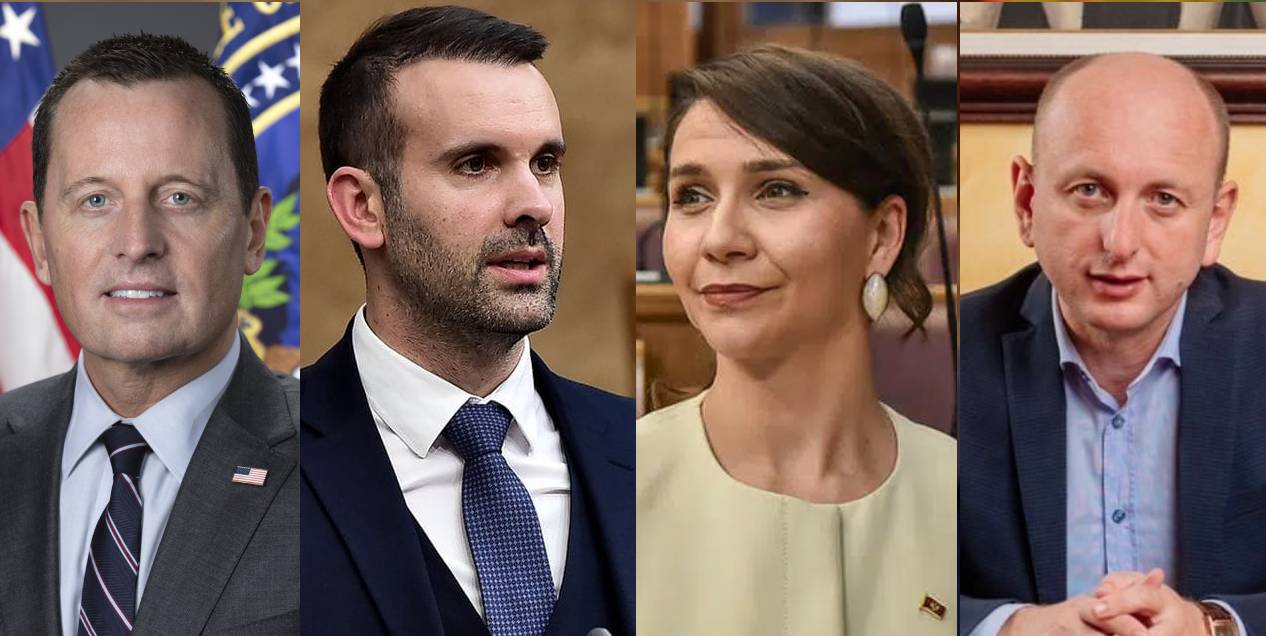
Richard Grenell, former U.S. envoy for the Serbia–Kosovo dialogue and once a powerful figure in Donald Trump’s first administration, reappeared in the Balkans this August on what was labeled an “unofficial visit.” His meetings and media appearances, however, looked suspiciously like an improvised diplomatic tour. Still, regional interlocutors who interacted with Grenell during his visit say that his vocabulary and tone sounded like that of an envoy on official mission, though he never formally claimed such a role. He even hinted, indirectly, that next year he would be back in a far more powerful position — effectively pitching himself
Last Thursday afternoon, Antena M reported that Milorad Dodik, the recently convicted president of Republika Srpska (RS), met with U.S. special presidential envoy Richard Grenell at the One and Only hotel in Portonovi, Montenegro. While authorities in Banja Luka did not confirm the meeting, it was notable that a rally organised by Dodik’s party (the Independent Social Democrats), originally planned as a protest related to his court verdict, was abruptly canceled. Antena M further reported that an unnamed Republican congresswoman was present at the meeting. No Montenegrin officials were involved or played any role in organising the encounter at the resort near the city of Herbage Novi.
However, Monitor received information, which could not be independently verified, suggesting that Grenell also met with Montenegro’s Prime Minister Milojko Spajic and Minister Majda Adzovic on the same day. Allegedly, discussions were uncomfortable and centred around recent turbulence related to airport concession deals in Montenegro. Officials close to the prime minister denied that any such meeting took place, while Minister Adzovic did not answer inquiries.
Earlier, on July 19, Nik Gjeljoshaj who simultaneously serves as Deputy Prime Minister, Economic Development Minister, and chair of the commission overseeing airport concessions informed the public that he had met with Grenell in Washington. In a statement from the U.S., he expressed gratitude to Grenell as “a great friend of the Balkan countries,” and requested support for the country’s accession toward European Union and stronger ties with the United States. During his U.S. visit, Gjeljoshaj claimed to have met in an official capacity with the FBI Director and his “senior leadership team.” Discussions were said to revolve around “the essential importance of upholding the rule of law to attract investments from Western countries and the U.S.” However, the Government publicly denied sending him and said that Gjeloshaj traveled to the U.S. privately. The Deputy PM did not provide any photographic evidence of these meetings. Before his trip, Mr Gjeloshaj was visibly dissatisfied with the tender outcome and the failure of the U.S.–Luxembourg bidder for the airport concessions that he was in favour of.
The day after the Portonovi meeting with Dodik, borba.me reported that on the evening of August 8 “in one Montenegrin coastal town”, Milan Knezevic, the leader of the Democratic People’s Party (DNP) met with Grenell. The meeting reportedly lasted nearly two hours, marked by open dialogue and exchange of of views.
The portal, considered an informal outlet of the pro-Serbia and pro-Russia “For the Future of Montenegro” (ZBCG) coalition, reported that Knezevic “detailed to Grenell the current political situation” – including internal relations in the government and various security, economic and international challenges. The interlocutors agreed “to continue communication and exchange of experiences,” with a prospect of a follow-up meeting in the future .
After departing Montenegro, Grenell continued on to Croatia. He shared on Instagram a photo of him posing with friends in the old town of Dubrovnik. The same day the Kosovar portal Gazeta Express reported that during his stay in the Western Balkans, Grenell met with Shkëlqim Devolli, a shareholder of the prestigious Devolli Corporation, founded by his father Ibrahim Devolli. Shkëlqim Devolli is a regular visitor to the U.S., often seen with influential figures like Republican senators Roger Wicker and Ted Cruz, Texas Governor Greg Abbott, and CIA Director John Ratcliffe.
Gazeta Express highlighted that the main topic of discussion was “stimulating economic growth in Kosovo through foreign investment.” It also noted that Grenell “confirmed the Trump administration’s continued commitment to supporting Kosovo and the Western Balkans,” thus promoting peace, stability, and prosperity. Just like with Knezevic and borba.me, the Gazeta Express account carries an official-sounding narrative, with the identical promise that the parties will “continue the dialogue and explore concrete ways to implement joint projects that would bring sustainable economic benefits and strengthen U.S.–Kosovo relations.” Although the location of the meeting was not disclosed, according to Monitor’s information, Grenell visited the Albanian seacoast prior to coming to Montenegro. In Albania he held a series of meetings with government officials and gave an interview to Klan Kosova – published on August 9.
Allegedly, Grenell was also seen in the region with Serbian Minister of Finance Sinisa Mali. It’s worth recalling that at the end of October 2023, Serbian President Aleksandar Vucic awarded Grenell the Order of the Serbian Flag, First Degree, for “outstanding merits in developing and strengthening peaceful cooperation and friendly relations between Serbia and the United States.” A similar decoration had been awarded to him by Kosovo three years earlier.
Still, the meetings with Albanian officials were not publicized—partly due to uncertainty over Grenell’s status, as he is on poor terms with key figures in President Trump’s administration—Secretary of State Marco Rubio and Trump’s chief of staff Susie Wiles. Grenell’s great influence during Trump’s first mandate is a thing of the past, at least for now, according to U.S. press reports. His actual job at this moment is acting director of the John F. Kennedy Center for the Performing Arts.
Regional interlocutors who were in Grenell’s circle during the visits say his vocabulary sounded as if he were on an official mission, even though he never formally said so. He also indirectly suggested that next year he would hold a significantly higher position than now, thus pitching himself in the region.
When asked whether Grenell was acting in an official capacity in Montenegro and whether it had mediated the meeting with Dodik, the U.S. Embassy in Podgorica referred Monitor to the State Department’s European desk. After the same inquiry, the State Department replied that Monitor should contact Grenell’s office directly. No response arrived prior to this publication. Unofficially, Washington sources told Monitor that the State Department had nothing to do with Grenell’s regional visit and that he was acting as a “freelance”.
Regardless of Grenell’s current status or his career’ trajectory, a big question remains as to how prepared Montenegro is for increasingly unpredictable international relations. So far, bilateral relations between Spajic’s government and the United States have not been impressive. A week ago, U.S. Secretary of State Rubio received Serbian Foreign Minister Marko Djuric—formerly Serbia’s ambassador in Washington, who built a strong Serbian caucus in the U.S. Congress. Rubio announced a “strategic dialogue with Serbia” for the end of the year. This is a process the State Department often carries out to strengthen bilateral relations. It entails high-level discussions on a wide spectrum of topics—defence, security, energy. Djuric emphasized that Serbia requested U.S. government support for issues important to Belgrade, and that his trip to Washington was significant for repositioning Serbia with the new administration. There’s no doubt that Montenegro is on Serbia’s top priorities list.
From the Montenegrin side, however, the current ambassador to the U.S. and the government seem largely indifferent to the disappearance of the Montenegrin caucus and show little effort in building strong ties with Trump’s administration. Previous head of mission in Washington, Nebojsa Todorovic, repeatedly briefed the government and foreign ministry well before the presidential elections that Trump’s return was inevitable and to prepare for it. Even President Jakov Milatovic’s visit to Ohio for the NATO Parliamentary Assembly meeting in Dayton (23-26 May), to mark 30 years of the Dayton Peace Agreement, was poorly prepared. Neither the embassy nor the foreign ministry knew that the U.S. state delegation would only be present on the first day in Dayton. Only thanks to intervention by the former ambassador did Milatovic’s delegation arrive a day earlier. That paved the way for Milatovic’s meeting with Deputy Secretary of State Christopher Landau—which, at such a gathering and outside the capital, carried considerable significance. Similar mistakes by the foreign ministry, ambassadors, and chargés d’affaires have also occurred in European capitals, with serious oversights about dates and availability of European officials.
The lack of serious diplomatic effort and narrow party interests could cost Montenegro dearly. Neighbouring countries, more skilled in lobbying, may shrewdly exploit this for their own interests—which are often at the expense of Montenegrin interests.
Jovo MARTINOVIĆ
Komentari
IN ENGLISH
Government Summons Ambassadors for Consultations and Instructions: A Foreign Policy Tightrope
Objavljeno prije
7 mjesecina
12 Aprila, 2025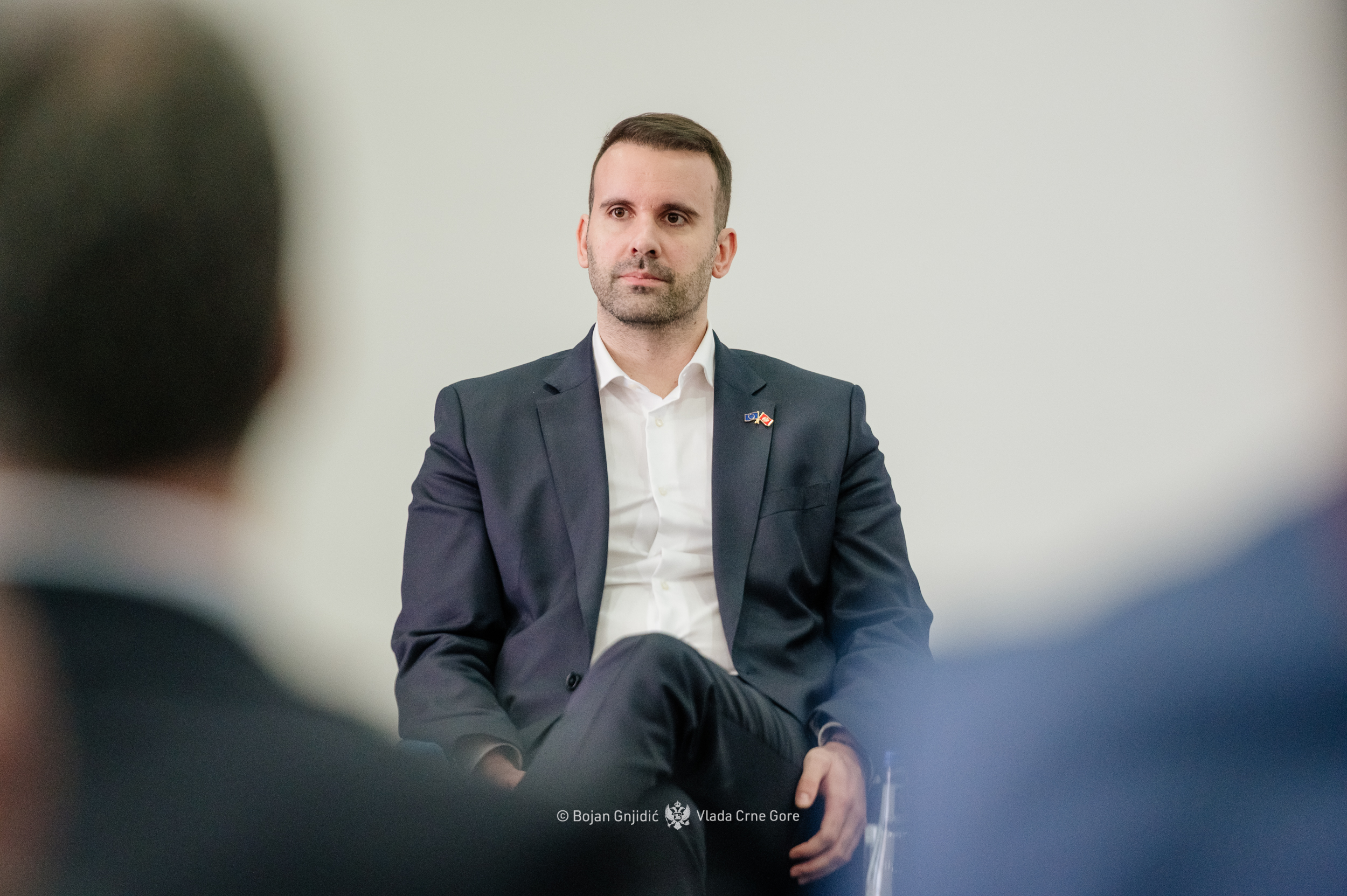
Prime Minister Milojko Spajic recently held a series of individual meetings with Montenegrin ambassadors—from Ukraine to Europe to the United States. Informal sources within the government say that during these meetings, the Prime Minister outlined a new geopolitical landscape shaped by Donald Trump’s return to power in the U.S. and evolving dynamics with the European Union
At the end of February, the Ministry of Foreign Affairs (MFA), led by Minister Ervin Ibrahimovic, summoned nearly all Montenegrin ambassadors stationed in Europe and the U.S. for urgent consultations, set to begin on March 6. The move sparked anxiety among some diplomats, who feared a repeat of the events of November 15, 2024, when three ambassadors were abruptly dismissed.
Monitor finds out that Spajić met separately with key diplomats, including Ukraine-based Borjanka Simicevic and U.S.-based Jovan Mirkovic. However, the concerns of mass dismissals proved unfounded. Instead, sources say the Prime Minister emphasized Montenegro’s continued commitment to the EU and instructed ambassadors to maintain a clear, pro-European stance. At the same time, he advised them against making any public criticisms of the United States or commenting on current rifts between the U.S. and its European allies.
Montenegro’s calibrated position became evident on March 11 at a meeting of top European military officials in Paris, where strategies for supporting Ukraine were discussed following Washington’s announcement of a suspension in military aid. The U.S. was not invited to the Parish meeting as the European leaders were keen to show they could step up independently if needed. Though an AP report initially stated that only Montenegro and Croatia, among NATO’s European members, failed to respond to the invitation, the Prime Minister’s Security and Defense Advisor, Todor Goranovic, told Radio Free Europe (RFE) that Montenegro would indeed participate. However, only the deputy military representative to NATO in Brussels attended because “Chief of General Staff Zoran Lazarevic was officially visiting Bulgaria at the time” – Goranovic explained.
Meanwhile, dissatisfaction is growing within Montenegro’s ruling coalition over Ambassador Mirkovic’s performance (or the lack thereof) in Washington. Tensions reportedly flared after a mid-February meeting with U.S. officials where he suggested that the fall of Serbian President Aleksandar Vucic could weaken some of his Montenegrin puppets. The details of the aforesaid meeting could not be independently confirmed. The subsequent report sent to Podgorica reportedly angered Spajic’s coalition partners from the former Democratic Front (DF). Although the DF was not directly mentioned in the report, its officials saw themselves as being referred to by the ambassador. One of them even retorted that those remarks would be a ground for the ambassador’s recall.
Discontent also emerged from the opposite ideological camp. Metropolitan Boris of the Montenegrin Orthodox Church (MOC) sent a protest letter to Minister Ibrahimovic, complaining that the embassy in Washington did not engage with the MOC delegation during their visit. The embassy, he wrote, failed to meet with them or assist in organizing meetings with U.S. officials. Furthermore, Metropolitan Boris complained that the embassy was “ignorant of some names and institutions that we wanted to reach out to”. He directly blamed the ambassador for the embassy’s dismissive stance.
As Monitor has previously reported, the embassy in Washington is increasingly out of sync with developments in the U.S. The once-prominent Montenegrin Caucus in Congress, which boasted 42 members under former ambassador Srdjan Darmanovic, has effectively dissolved. It’s now reduced to a single member—Congresswoman Chellie Pingree from Maine. Darmanovic had successfully lobbied to counter opposition to Montenegro’s NATO membership, despite concerns over ties of the Djukanović government with foreign criminal networks and Russian intelligence services.
Pingree reportedly sent multiple letters to the embassy criticizing the lack of engagement, but received no response. Monitor also reached out to her office twice for comment but had not received a reply at the time of publication.
Diplomatic affairs aren’t running smoothly in Europe either. In late January, the government approved the appointment of 14 new ambassadors. The list was coordinated with President Jakov Milatovic, whose signature is required for the appointments. Opposition parties and members of the pro-Serbian bloc raised objections, particularly over the inclusion of figures associated with the long-ruling Democratic Party of Socialists (DPS) and former foreign minister Milan Rocen.
One such appointee is Dragana Radulović, a longtime diplomat and former advisor to Prime Minister Dusko Markovic. She was posted to New York as Montenegro’s representative to the UN. She has been in diplomacy since 2000. Internal sources indicate that Veljko Milonjic initially hoped for the post in New York but was instead sent to Warsaw. Milonjic is remembered for his involvement in the so-called “cocaine affair” of 2015 when he was the head of Montenegro’s consulate in Munich. A truck from Munich carrying drugs under diplomatic seal was intercepted at the Austrian border. Though the Ministry of Foreign Affairs denied direct involvement, the incident cast a long shadow. Milonjic denied wrongdoing but was quietly recalled while the Consulate General in Munich was closed down. Milonjic was later appointed to a senior diplomatic post despite the scandal never being prosecuted. The truck driver, Sasha Mugosha, was sentenced to six years in prison. He was released after serving two and a half years and deported to Montenegro.
In March, the government announced that former German Bundestag member Holger Haibach had been appointed as a senior special advisor to Prime Minister Spajic, beginning January 1. Haibach will advise on regional relations in the Western Balkans and support EU accession efforts. His services will be funded by Germany’s Center for International Peace Operations (ZIF). While Haibach’s selection followed a public hiring process, sources in the diplomatic community question his current influence in Berlin. Haibach, a former CDU member of parliament, left office in 2011. Meanwhile, Veljko Kustrov, a Herzegovinian with close ties to Spajic, is considered his main point of contact in Germany.
Perhaps the most controversial diplomatic appointment so far is that of Dusanka Jeknic, a figure from the 1990s linked to the Djukanovic regime and repeatedly associated with cigarette smuggling. However, the Italian prosecutors could not present sufficient evidence against her in court. Jeknic was assigned to the embassy in Turkey after President Milatovic purchased property from her in Podgorica. Milatovic later claimed he had not been consulted on her appointment, stating that such decisions were under the MFA’s jurisdiction. He emphasized that his property purchase had been properly reported to Montenegro’s Agency for the Prevention of Corruption.
Previously, Milatovic had criticized the appointment of Predrag Drecun to lead Montenegro’s Investment Development Fund because of his close ties to the Djukanovic regime.
Montenegro is yet to drive a long and bumpy road before it gets a professional diplomatic network.
Jovo MARTINOVIĆ
Komentari
IN ENGLISH
TWILIGHT OF MONTENEGRIN INTERESTS IN AMERICA: Prayer Breakfast Instead of Real Diplomacy
Objavljeno prije
7 mjesecina
12 Aprila, 2025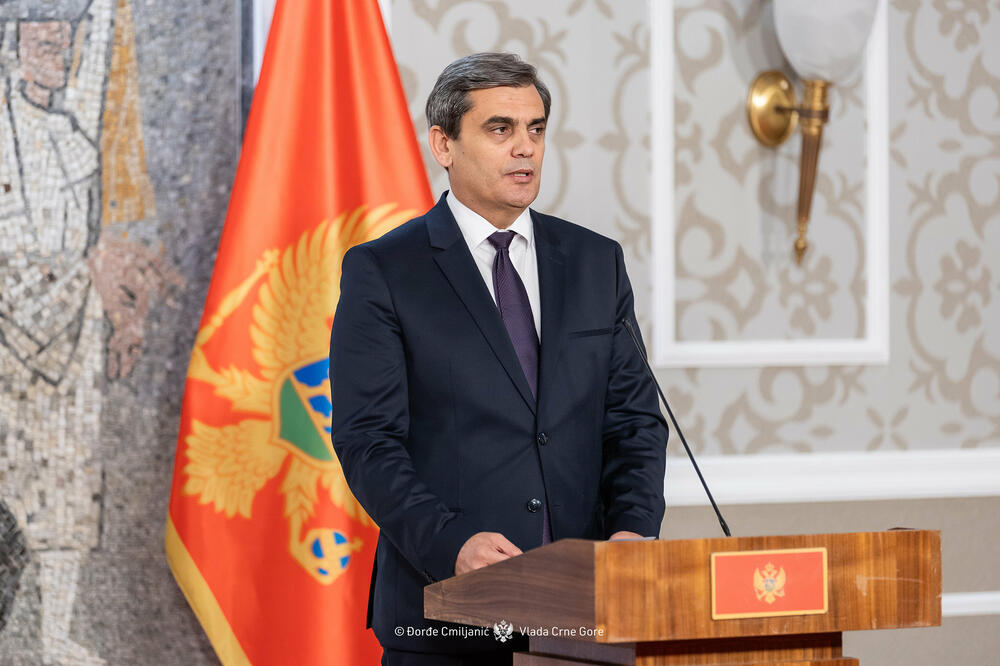
Aside from occasional trips and engagements with diaspora organizations, Montenegro shows little sign of having a coherent lobbying strategy in the United States. With the retirement of Congressman Doug Lamborn, the Montenegrin Congressional Caucus has dwindled to just one representative: Congresswoman Chellie Pingree from Maine
The 73rd annual National Prayer Breakfast in Washington recently took place, drawing more than three thousand leaders and prominent figures from politics and civil society from around the globe. Over the course of two days, participants had opportunities to network and exchange ideas at the Hilton Hotel, under the official patronage of the U.S. President.
Invitations were extended to a broad range of Montenegrin officials, including Prime Minister Milojko Spajic, Foreign Minister Ervin Ibrahimovic, Deputy Prime Minister for Economic Policy Nik Djeljoshaj, Minister of Urban Planning Slaven Radunovic, Minister of Transport Maja Vukicevic, and Minister for Human and Minority Rights Fatmir Djeka. Parliamentary invitees included many MPs, both from the opposition and the majority. Former President Milo Djukanovic and his close aide Branimir Gvozdenovic received invitations as well as several other ex officials. Also in attendance was Vijesti columnist and co-founder Zeljko Ivanovic—reportedly the only one whose travel wasn’t funded by taxpayers.
Branimir Gvozdenovic is often featured in pro-DPS (Democratic Party of Socialists) media as a regional liaison for the Prayer Breakfast. However, his name is absent from the official records of the event’s organizing foundation. Meanwhile, the Montenegrin delegation was accompanied by support staff including security, administrative personnel, and translators — necessary, since only Minister Vukicevic speaks fluent English. Translation was required for Djukanovic, Gvozdenovic and most MPs.
The cost of attending the Prayer Breakfast—including registration fees, three nights in a hotel, airfare, and daily allowances (currently €112 per day) — typically totals around $3,000 per person. When accompanying staff is added, the total bill reaches into the tens of thousands of euros. Out of the entire group, only Ministers Ibrahimović and Djeka were scheduled for official meetings at the U.S. State Department.
Minister for the Diaspora Adem Azemovic, representing the Bosniak Party, made his second trip to the U.S. in a month, accompanied by two associates. In late December, he met with Naser Nika, head of the Albanian-American Association of Staten Island. After the New Year he returned to meet him again. When asked why a second meeting was necessary, the Ministry explained that the first encounter had been brief, and the second was based on an official invitation. The association, which includes Albanian Montenegrins living in Staten Island, was praised for promoting Montenegro in New York.
Azemovic also visited the New York State Assembly, which is reportedly considering hosting Montenegro’s Independence Day celebration. His office described this as an opportunity to mark one of the country’s most significant holidays in a high-profile setting. Interestingly, Montenegro’s Independence Day was already celebrated at New York City Hall on May 23, 2024, in an event organized by the Albanian-American Association of Ulcinj. That celebration included Montenegro’s Consul Amer Cikotic and the Association’s president Dzelal Lanica. Nika had publicly criticized the event on Facebook, claiming that it misrepresented interethnic relations in Montenegro and highlighted Serbian political influence via Serbian President Vucic-backed factions.
Despite these diaspora engagements, there is little to suggest that Montenegro has any serious lobbying efforts in Washington—particularly with key decision-makers. Nebojsa Medojevic, leader of the Movement for Change (PZP), remarked that “Montenegro simply failed to grasp the magnitude and significance of political changes occurring in the U.S.”
“The current ambassador —Professor Jovan Mirković is openly anti-Trump and a personal ally of Aco and Milo Djukanovic” Medojević stated. “He has no meaningful contacts in Washington and no ideological alignment with the current direction of U.S. politics, so it’s unclear who or what he’s even representing.” He went on to question the competence and professionalism of the current government’s foreign policy team.
Interestingly, Nebojsa Todorovic, the former chargé d’affaires in Washington, had warned the Ministry of Foreign Affairs (MFA) and the government in late 2023 to prepare for a potential return of Donald Trump.
Since arriving in Washington in mid-September, Ambassador Mirkovic has maintained a notably low profile. His biography reveals he spent several years in Russia during the early 1990s—the same period when Milan Rocen was serving as minister-counselor at the Yugoslav embassy. Sources claim that Mirkovic has family ties in Russia and is known for his longstanding loyalty to the Djukanovic regime. Neither Djukanovic nor his Democratic Party of Socialists (DPS) have ever renounced their 2011 strategic cooperation agreement with Putin’s United Russia. In fact, the DPS publicly reaffirmed its pride in these ties in Parliament last year.
With the departure of Doug Lamborn—one of the Montenegrin Caucus’s co-chairs—the group now counts only a single member: Congresswoman Chellie Pingree. Meanwhile, Serbia has been actively growing its influence. Foreign Minister Marko Djuric, a former ambassador to Washington, has built up the Serbian Caucus to nearly 40 members. Djuric even boasted that Serbia, though not a NATO member, has stronger U.S. ties than Montenegro.
Some claim that Serbia pressured Podgorica through influential regional businessmen into sending a low-impact figure to Washington. The contrast with past Montenegrin diplomacy is stark: Under Ambassador Srdjan Darmanovic, the Montenegrin Caucus had grown to 42 members, surpassing even the Albanian caucus. Darmanovic worked closely with Congressman Mike Turner to gain U.S. support for NATO accession—despite Djukanovic’s regime then-notorious links to organized crime and Russian intelligence services.
Efforts to revive the caucus were briefly relaunched by Nebojsa Todorovic, who during his stint as chargé d’affaires in 2023 helped re-engage 10 U.S. lawmakers, including Turner and other influential committee chairs such as Michael McCaul and Robert Aderholt. For a brief period, Montenegro held a unique status in the Balkans, with three Congressional committee leaders in its caucus.
However, Todorovic has since been recalled, and with him, much of Montenegro’s presence in Washington has faded again into inertia.
This raises uncomfortable questions: Is Spajic’s government reverting to the old practice of conducting diplomacy through informal channels and business networks, as seen under Djukanovic and his top advisor Rocen? At the time, oligarchs like Oleg Deripaska and other Putin loyalists were reportedly enlisted to lobby for Montenegro in the West.
That line of approach came at a steep cost to the country—and its reputation.
Jovo MARTINOVIĆ
Komentari
Kolumne

Novi broj
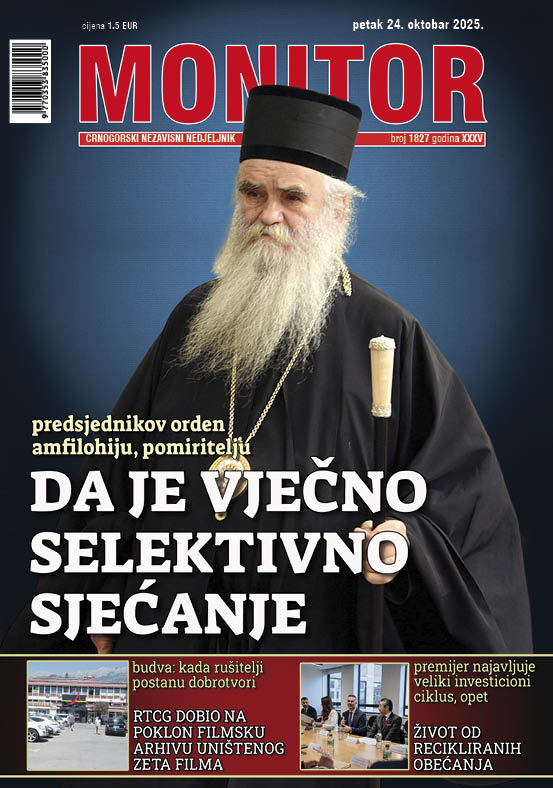

PREDSJEDNIKOV ORDEN AMFILOHIJU, POMIRITELJU: Da je vječno selektivno pamćenje

PREMIJER NAJAVLJUJE VELIKI INVESTICIONI CIKLUS, OPET: Reciklaža obećanja

BUDVA: KADA RUŠITELJI POSTANU DOBROTVORI: RTCG dobio na poklon filmsku arhivu uništenog Zeta filma
Izdvajamo
-
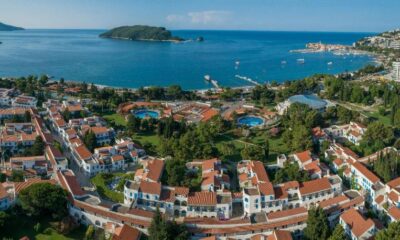
 DRUŠTVO3 sedmice
DRUŠTVO3 sedmiceATAK MK GRUPE NA SLOVENSKU PLAŽU: Da li će vlada prodati najvrjedniji turistički brend
-
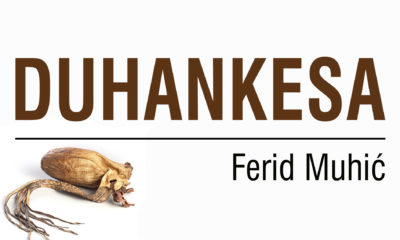
 DUHANKESA3 sedmice
DUHANKESA3 sedmice7. oktobar 2023.
-
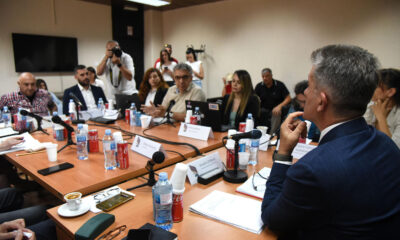
 DRUŠTVO3 sedmice
DRUŠTVO3 sedmiceNAKON PRVOSTEPENE PRESUDE PROTIV ČLANOVA SAVJETA RTCG: Vlast brani servis
-
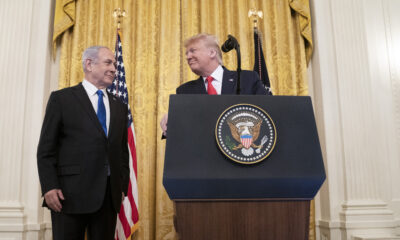
 Izdvojeno3 sedmice
Izdvojeno3 sedmiceNOVI PLAN ZA GAZU: Mir zbog Nobela ili rat zbog rivijere
-
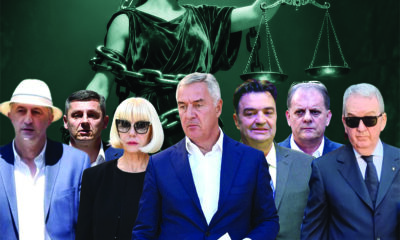
 FOKUS3 sedmice
FOKUS3 sedmiceAFERE PRED PRAVOSUĐEM: Korumpiranih nemamo
-
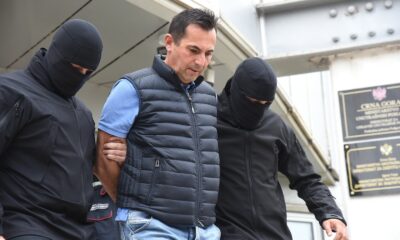
 FOKUS2 sedmice
FOKUS2 sedmiceALEKSANDAR MIJAJLOVIĆ I DRUŠTVO: Ogledalo
-
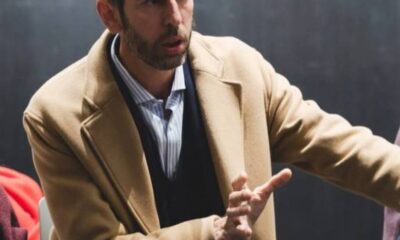
 INTERVJU3 sedmice
INTERVJU3 sedmiceVUK IKOVIĆ, BIOLOG: Politikanstvo je isključilo struku
-
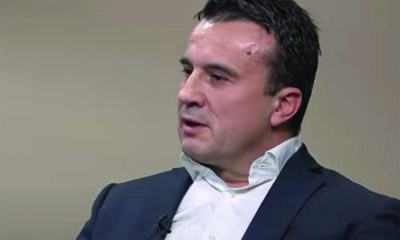
 DRUŠTVO2 sedmice
DRUŠTVO2 sedmiceMK GRUPA ŽELI DA GRADI STANOVE NA SLOVENSKOJ PLAŽI: Oko 300 hiljada novih komercijalnih kvadrata umjesto hotela






